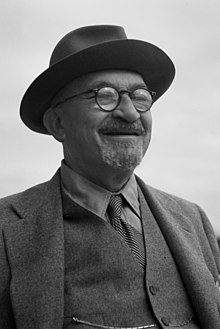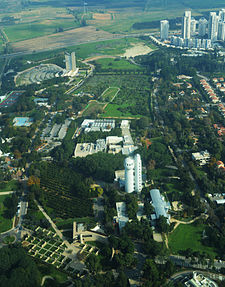מכון ויצמן למדע (Hebrew) | |
 | |
Former name | Daniel Sieff Research Institute (1934–1949) |
|---|---|
| Type | Public research |
| Established | 1934 |
| Founder | Chaim Weizmann |
| Endowment | $600.427 million (2019)[1] |
| President | Alon Chen |
Academic staff | 952 |
Administrative staff | 400 |
| Students | 1,082 |
| Postgraduates | 356 |
| 700 | |
| Location | , |
| Campus | Urban |
| Postdoctoral fellows | 380 |
| Affiliations | Feinberg Graduate School[2] |
| Website | www |
| Academic rankings | |
|---|---|
| National | |
| ARWU[3] | 2–3 |
| Global | |
| ARWU[4] | 1-100 |


The Weizmann Institute of Science (Hebrew: מכון ויצמן למדע Machon Weizmann LeMada) is a public research university in Rehovot, Israel, established in 1934, fourteen years before the State of Israel was founded. Unlike other Israeli universities it exclusively offers postgraduate-only degrees in the natural and exact sciences.
The institute is a multidisciplinary research center, employing around 3,800 scientists, postdoctoral fellows, Ph.D. and M.Sc. students, and scientific, technical, and administrative staff working at the institute.[5][6]
As of 2019, the Weizmann Institute of Science has been associated with six Nobel laureates and three Turing Award winners.[7]
History
[edit]

The institute was founded in 1934 by Chaim Weizmann and his initial (1st) team, which included Benjamin M. Bloch, as the Daniel Sieff Research Institute. Weizmann had invited Nobel Prize laureate Fritz Haber to be the director, but following Haber's death en route to Palestine, Weizmann assumed the directorship himself. Before he became President of Israel in February 1949, Weizmann conducted his research in organic chemistry at its laboratories. On November 2, 1949, in agreement with the Sieff family, the institute was renamed the Weizmann Institute of Science in his honor.
WEIZAC, one of the world's first electronic computers was locally built by the institute in 1954–1955 and was recognized by the IEEE in 2006 as a milestone achievement in the history of electrical and electronic engineering.[8]
In 1959, the institute set up a wholly owned subsidiary called Yeda Research and Development Company to commercialize inventions made at the institute.[9] Yeda has more marine genetic patents than any other research institute.[10] By 2013 the institute was earning between $50 and $100 million in royalties annually on marketed drugs including Copaxone, Rebif, and Erbitux.[11][12]
Graduate program
[edit]As of 2015, the Weizmann Institute had approximately 2,500 students, postdoctoral fellows, staff, and faculty, and awards M.Sc. and Ph.D. degrees in mathematics, computer science, physics, chemistry, biochemistry, and biology, as well as several interdisciplinary programs.[5] The symbol of the Weizmann Institute of Science is the multibranched Ficus tree.[13] Undergraduates and recent graduates must apply to M.Sc. programs, while those earning an M.Sc. or an MD can apply directly to Ph.D. programs. Full fellowships are given to all students.[14]
Youth programs
[edit]
In addition to its academic programs, the Weizmann Institute runs programs for youth, including science clubs, camps, and competitions. The Bessie F. Lawrence International Summer Science Institute accepts high-school graduates from all over the world for a four-week, science-based summer camp. The Clore Garden of Science, which opened in 1999, is the world's first completely interactive outdoor science museum.[5][15]
Rankings
[edit]The Weizmann Institute of Science was ranked number 2, globally, for research quality by the Nature Index in 2019,[16] and in the top 25 research institutes/universities in the world in two main categories by U-Multirank, 2019: Top Cited Publications and Patents Awarded.[17] The institute was in 7th place in the European Research Council report in 2020 for its high rate of success in obtaining research grants.[18] In 2018 the institute was ranked 9th, globally, (1st in Israel) by the CWTS Leiden Ranking, which is based on the proportion of a university's scientific papers published between 2012 and 2015 that made the 10% most cited in their field.[19]
Presidents
[edit]- Chaim Weizmann (1934–1952)
- Meyer Weisgal (1952–1959 as acting director)
- Abba Eban (1959–1966)
- Meyer Weisgal (1966–1970)
- Albert Sabin (1970–1972)
- Israel Dostrovsky (1972–1975)
- Michael Sela (1975–1985)
- Aryeh Dvoretzky (1985–1988)
- Haim Harari (1988–2001)
- Ilan Chet (2001–2006)
- Daniel Zajfman (2006–2019)
- Alon Chen (2019–present)
The nonscientists Abba Eban and Meyer Weisgal were assisted by scientific directors, as was Weizmann himself owing to his duties as the first president of Israel. The following persons held the position of scientific director:
- Ernst David Bergmann (1949–1951)
- Amos de-Shalit (1960–1961 and 1966–1968)
- Shneior Lifson (1962–1966)
- Gerhard Schmidt (1969)
Faculty
[edit]- Uri Alon, systems biologist
- Ruth Arnon, immunologist
- Arkady Aronov, condensed matter physicist
- Mordechai Ben-Ari, computer scientist
- Ari Ben-Menahem, geophysicist
- Achi Brandt, mathematician
- Shikma Bressler, physicist
- Irun Cohen, immunologist
- David Danon, biologist
- Amos de-Shalit, physicist
- Irit Dinur, computer scientist and mathematician
- Israel Dostrovsky, physical chemist
- Yadin Dudai, neuroscientist
- Harry Dym, mathematician
- Marvin Edelman, biologist
- Benjamin Elazari Volcani, discoverer of life in the Dead Sea and pioneer in biological silicon research
- Aviezri Fraenkel, mathematician
- Asher A. Friesem, physicist
- Stephen Gelbart, mathematician
- Joseph Gillis, mathematician
- Daniella Goldfarb, chemist
- Oded Goldreich, computer scientist
- Shafrira Goldwasser, computer scientist, two-time winner of the Gödel Prize (1993 and 2001), and the Turing Award (2012)
- Jacob Hanna, molecular geneticist
- Haim Harari, theoretical physicist
- David Harel, computer scientist
- Yoseph Imry, theoretical physicist
- Michal Irani, computer scientist
- Yohai Kaspi, physicist
- Aharon Katzir, chemist
- Ephraim Katzir, biophysicist, fourth President of the State of Israel
- Bruria Kaufman, theoretical physicist
- Jacob Klein, chemist
- Meir Lahav, chemist[20]
- Erez Lapid, mathematician
- Leslie Leiserowitz, chemist
- Ulf Leonhardt, physicist
- Alexander Lerner, mathematician
- Michael Levitt, chemical physics, presently at Stanford University, Nobel Prize in Chemistry winner (2013)
- Moshe Levy, chemist
- Shneior Lifson, physicist
- Harry J. Lipkin, physicist
- Henry Markram, neuroscientist
- Mordehai Milgrom, astrophysicist
- David Milstein, organic chemist
- Moni Naor, computer scientist
- Yuval Oreg, physicist
- Chaim L. Pekeris, geophysicist
- Amir Pnueli, computer scientist, Turing Award winner (1996)
- Ran Raz, computer scientist
- Amitai Regev, mathematician
- Omer Reingold, computer scientist
- Leo Sachs, molecular biologist
- Josip Schlessinger, biochemist and biophysician
- Michal Schwartz, neuroimmunologist
- David Samuel, 3rd Viscount Samuel, chemist
- Eran Segal, computational biologist
- Lee Segel, applied mathematician
- Michael Sela, immunologist
- Adi Shamir, cryptographer, Turing Award winner (2002)
- Ehud Shapiro, computer scientist and computational biologist
- Nathan Sharon, biochemist
- Amnon Shashua, computer scientist
- Liran Shlush, immunologist
- Franz Sondheimer, chemist
- Ady Stern, physicist
- Joel Sussman, crystallographer
- Igal Talmi, physicist
- David Tannor, theoretical chemist
- Dan Tawfik, biochemist, EMET Prize 2020
- Reshef Tenne, chemist
- Edward Trifonov, molecular biophysicist
- Shimon Ullman, computer scientist
- Gabriele Veneziano, theoretical physicist
- David Wallach, biochemist
- Arieh Warshel, chemical physics, presently at University of Southern California, Nobel Prize in Chemistry winner (2013)
- Chaim Weizmann, chemist, first President of the State of Israel
- Meir Wilchek, biochemist
- Ada Yonath, crystallographer, Nobel Prize in Chemistry winner (2009)
- Daniel Zajfman, physicist
Alumni
[edit]- Amikam Aharoni, physicist
- Dorit Aharonov, computer scientist
- Joanna Aizenberg, professor of chemistry
- Uri Alon, systems biologist
- Ella Amitay Sadovsky, artist
- Haim Aviv, molecular biologist
- Karen Avraham, geneticist
- Neta Bahcall, astrophysicist
- Eli Biham, cryptographer and cryptanalyst
- Ofer Biham, physicist
- Achi Brandt, mathematician
- Joseph Buxbaum, geneticist and neuroscientist
- Alon Chen, neuroscientist
- Nachum Dershowitz, computer scientist
- Danny Dolev, computer scientist
- Dov Dori, computer scientist
- Yadin Dudai, neuroscientist
- Amos Fiat, computer scientist
- Nir Friedman, computer scientist and biologist
- Ehud Gazit, biochemist and nanotechnologist
- Alexander Goldfarb, microbiologist, activist, and author
- Eliezer (Eli) Huberman, biologist
- Yoseph Imry, theoretical physicist
- Jonathan Kipnis, neuroscientist
- Bernard H. Lavenda, chemical physicist
- Anders Levermann, climate scientist
- Alexander Levitzki, biochemist
- Yehuda Lindell, computer scientist
- Mario Livio, astrophysicist
- Miron Livny, computer scientist
- Henry Markram, neuroscientist
- Raphael Mechoulam, organic chemist
- David Peleg, computer scientist
- Amir Pnueli, computer scientist
- Omer Reingold, computer scientist
- Gideon Rodan, biochemist
- Asya Rolls, neuroscientist
- Barton Rubenstein, modernist sculptor
- Shmuel Safra, computer scientist
- Josip Schlessinger, biochemist and biophysician
- Nathan Seiberg, physicist
- Adi Shamir, cryptographer
- Amnon Shashua, computer scientist
- Andrey Sivachenko, computational biologist and computer scientist, Professor at Harvard University Extension School[21]
- Nahum Sonenberg, biochemist
- Hermona Soreq, molecular neuroscientist
- Dan Tawfik, biochemist
- Eli Upfal, computer scientist
- Lev Vaidman, physicist
- Moshe Vardi, computer scientist
- Inder Verma, cancer researcher and molecular biologist
- Arieh Warshel, chemist
- Meir Wilchek, biochemist
- Ada Yonath, crystallographer
- Doron Zeilberger, mathematician
- Eitan Zemel, applied mathematician
See also
[edit]References
[edit]- ^ "FY 2019 Audited Financial Statements" (PDF). Weizmann Institute of Science. Retrieved 3 March 2021.
- ^ "About the Feinberg Graduate School (FGS)".
- ^ "ShanghaiRanking's 2023 Academic Ranking of World Universities". Shanghai Ranking Consultancy. Retrieved February 10, 2024.
- ^ "ShanghaiRanking's 2023 Academic Ranking of World Universities". Shanghai Ranking Consultancy. Retrieved February 10, 2024.
- ^ a b c "Scientific Activities: The Yeda-Sela (YeS) Center for Basic Research". Archived from the original on 27 April 2019. Retrieved 25 July 2015.
- ^ "Facts and Figures - Weizmann Institute of Science". Archived from the original on 16 October 2015. Retrieved 25 July 2015.
- ^ "Viewpoint: Focus funding on individual scientists to get the best results". 16 July 2019. Retrieved 12 October 2023.
- ^ "Milestones: WEIZAC Computer, 1955". IEEE. Retrieved 7 March 2018.
- ^ Borchardt, John (September 26, 2000). "Israeli biotech - a child with great promise". The Scientist.
- ^ Blasiak, Robert; Jouffray, Jean-Baptiste; Wabnitz, Colette C. C.; Sundström, Emma; Österblom, Henrik (June 6, 2018). "Corporate control and global governance of marine genetic resources". Science Advances. 4 (6): eaar5237. Bibcode:2018SciA....4.5237B. doi:10.1126/sciadv.aar5237. ISSN 2375-2548. PMC 5990308. PMID 29881777.
- ^ OECD Reviews of Innovation Policy OECD Reviews of Innovation Policy. OECD Publishing. 2006. p. 119. ISBN 9789264029750.
- ^ Weinreb, Gali (28 July 2013). "Yeda earns $50-100m annually". Globes (in Hebrew).
- ^ Institution resource development, Weizmann Institute of Science
- ^ "Fellowships & Aid". Weizmann Institute. Archived from the original on 28 July 2015. Retrieved 1 May 2019.
- ^ "2BackToHomePage3". Retrieved 25 July 2015.
- ^ "Nature index - Weizmann Institute of Science". Retrieved 3 June 2020.
- ^ "U-Multirank Weizmann Institute of Science". Retrieved 3 June 2020.
- ^ "European Research Council - Annual report on the ERC activities and achievements in 2019". 14 May 2020. Archived from the original on 3 June 2020. Retrieved 3 June 2020.
- ^ "CWTS Leiden Ranking". Leiden University. Retrieved 23 Jan 2018.
- ^ "Meir Lahav Home Page". May 2, 2001. Archived from the original on 2 May 2001.
- ^ "Andrey Sivachenko at harvard.edu".
External links
[edit]- Weizmann Institute of Science Website (in English)
31°54′27″N 34°48′33″E / 31.90750°N 34.80917°E
| International | |
|---|---|
| National | |
| Academics | |
| People | |
| Other | |